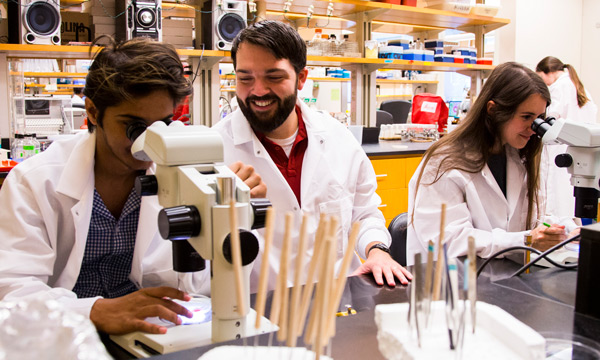Research
Emory has continued its rapid growth in research funding in 2024, with a total of over one billion in sponsored research funding for the second consecutive year.
Emory is a member of the Association of American Universities, an association of 71 leading research universities whose members are considered to be on the leading edge of innovation, scholarship and solutions that contribute to society's economy, security and well-being.
In 2024, Emory University School of Medicine was ranked in Tier 1 for research-oriented medical schools, a group that includes the top schools in the nation. U.S. News introduced group rankings for medical schools this year instead of assigning specific numbers for each institution. The publication ranked Emory 15th for most diverse medical schools.
Emory University continues to be ranked among the nation’s top universities, coming in 24th in U.S. News & World Report’s 2024 Best Colleges report.
Emory's faculty includes:
- 41 fellows of the American Association for the Advancement of Science
- 30 members of the American Academy of Arts and Sciences
- 26 members of the National Academy of Medicine
- 4 members of the National Academy of Sciences
- 2 Howard Hughes Medical Institute Professors
The Rollins School of Public Health was ranked 3rd in the nation by U.S. News and World Report (2024).
Molecular & Systems Pharmacology ranks 9th, Immunology & Molecular Pathogenesis and Microbiology & Molecular Pathogenesis both rank 10th, Population Biology, Ecology & Evolution ranks 11th, Genetics & Molecular Biology ranks 14th, and Biochemistry, Cell & Developmental Biology ranks 22nd.
Emory University continues to be one of the largest recipients of research funding from the National Institutes of Health (NIH), as reported by the Blue Ridge Institute for Medical Research (BRIMR). In 2023, Emory received more than $485 million and is amongst the top 20 in the nation overall for institutional funding from the NIH.
Emory University was selected as one of America's 25 New Elite 'Ivies' by Newsweek.
Seven research areas in the Graduate Division were ranked in the Top Ten for Faculty Scholarly Productivity by the Chronicle of Higher Education. These research areas include ecology, evolutionary biology, immunology, microbiology, molecular pharmacology, nutrition sciences and pharmacology.





